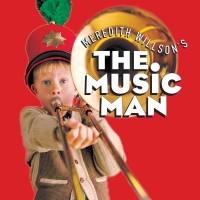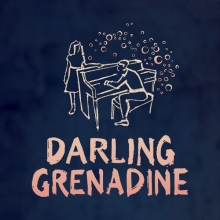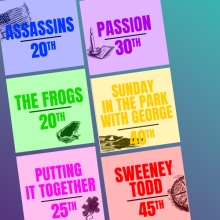
Full Synopsis
Act One
The play begins on the morning of July 4, 1912. A railroad conductor announces the next stop, River City, Iowa, to a coach filled with traveling salesmen. Speaking rhythmically (keeping time with the movement of the train), the salesmen begin a conversation about the merits of cash versus credit and the ways their products and lives have changed as the result of "modren" merchandising ("Rock Island"). One of the salesmen, Charlie Cowell, asks if anyone has heard of Professor Harold Hill, a salesman who is ruining the reputation of all traveling salesmen. Cowell explains that Hill moves from town to town, selling musical instruments, uniforms and the promise of lessons for a boy's band... and then leaves town with the collected money before anyone has discovered that he is musically illiterate. As the train stops in River City, Cowell, who has been trying to find and expose Hill, mentions that Hill wouldn't get far with the stubborn Iowans. Before the train begins to move again, a salesman who has quietly been playing cards, grabs his suitcase and announces that the conversation has prompted him to give Iowa a try. When asked his name, the stranger flashes his suitcase, bearing the name "Prof. Harold Hill," and quickly exits the train as it starts to move. He finds himself facing River City's Main Street, decorated with Fourth of July bunting and crowded with townspeople.
As workers move a pool table into the River City Billiard Parlor owned by Mayor Shinn, the townspeople greet the mayor and each other. They sing with pride of their contrariness ("Iowa Stubborn"). As they disperse, Hill enters the scene and tries to rent a horse and buggy at the livery stable. There, he meets his old friend and one-time partner-in-crime, Marcellus Washburn. Washburn, who knows Harold's real first name is Greg, remembers Hill's last sales gimmick was selling steam-powered automobiles. Hill tells Washburn that he'd be selling them still if somebody hadn't ruined his game by actually inventing such a vehicle! Marcellus has given up his old ways and has settled down in River City to work in the livery stable. After Harold explains his plans, Marcellus warns him to watch out for the town's music teacher/town librarian, Marian Paroo – she'd expose Harold's con on the spot. Harold asks him to point her out and then he sets about thinking of a way to convince the parents of River City of the necessity of a boy's band. When Marcellus tells him about the new pool table in town, Harold recognizes his chance. He approaches Ewart Dunlop, the grocery store owner, and begins talking about the trouble that has entered River City in the shape of a pool table. To the fast-growing crowd Harold delivers a rapid-fire sales pitch/sermon about the corrupting influence of a pool table on the boys of the town ("Trouble"); as the townspeople join him, Marcellus signals Marian Paroo is passing by.
Harold follows Marian home; she rejects his attempts to start a conversation with her on the street, finally slamming her front door in his face.
As Marian enters the house, Amaryllis, her young piano student, is playing an exercise while Mrs. Paroo, Marian's mother, continues with her household chores. Marian tells her mother about the strange man (Harold) who has been following her and trying to speak with her. While Amaryllis plays arpeggios, Mrs. Paroo scolds Marian for not speaking to the man, criticizing Marian's high expectations, both for the townspeople and for men ("Piano Lesson / If You Don't Mind My Saying So"). Winthrop, Marian's little brother, enters the house, and Amaryllis invites him to a party. Winthrop, who has a lisp and doesn't like to speak, mispronounces Amaryllis' name. When she giggles, he runs from the room. Amaryllis, upset that Winthrop never talks to her, starts crying and tells Marian that she is worried she'll never find a sweetheart to wish about on the evening star. Marian tells her to go on wishing, using the word "someone" until the right person comes along. As Amaryllis plays her crossed-hands piece, Marian gazes at the evening star and wishes her unnamed "someone" goodnight ("Goodnight, My Someone").
Inside the high school gymnasium, Mayor Shinn is presiding over the Fourth of July celebrations. His wife, Eulalie Mackecknie Shinn, who is dressed as Columbia, holds a torch and has just finished leading a song. As the mayor begins his stentorian recitation of the Gettysburg Address, he is stopped by the constantly bickering school board, who remind him that the next presentation is an Indian costume spectacle. The spectacle concludes with his wife counting to twenty in the "Indian tongue." Before she can finish counting, young Tommy Djilas lights a firecracker in front of her. The four school board members begin arguing as the mayor again tries his Gettysburg recitation. The mayor is foiled again, this time by Harold, who steals the crowd's attention, continuing his earlier sermon about the pool table. He tells the crowd he has come to River City to organize a boy's band as the solution to the corrupting influence of the pool table. He then entrances them with a story of when six of the greatest marching bands in America came to town on the very same day ("Seventy-Six Trombones"). The townspeople join in, dancing and parading around the gymnasium.
The mayor, alarmed at seeing the Iowans so excited, orders the school board to get Harold's credentials. As Tommy is being led out of the gymnasium by the constable, he is warned by the mayor to stay away from Zaneeta, the Shinn's oldest daughter. Harold realizes that, if he can make an ally of Tommy, he'd have the town's youth on his side, too. He quickly intercedes on Tommy's behalf and agrees to take responsibility for the boy. He asks Tommy to design a music holder for the piccolo. Harold then points out a passing girl and gives Tommy money to take her to the candy shop. After the teenagers leave, the constable tells Harold the girl is Zaneeta Shinn.
The school board approaches Harold and demands his credentials; Harold, stalling because he has no credentials, asks them each to sing the words "ice cream," which they do in perfect barbershop quartet harmony. Finding music more interesting than Harold, the quartet sings "Sincere" as Harold sneaks away to look for Marian.
Harold follows Marian to the library where, before slamming the door in his face, she warns him that she will check his credentials in the reference books. Marcellus appears to ask about Harold's progress. Harold explains that he'll be in town for four weeks, which is the time required for the delivery of the instruments, uniforms and instruction books. He also mentions to Marcellus that he circumvents his musical ignorance by advocating his "revolutionary Think System." This "System" replaces reading notes and practicing scales with positive thought. Marcellus tries to convince him to settle down in River City, but Harold tells him he prefers worldly women to the wholesome, innocent women of River City ("The Sadder-but-Wiser Girl").
The ladies of the town surround Harold, buzzing with excitement over the band. Mrs. Shinn, however, is still withholding her judgment until her husband receives Harold's credentials. When she moves her foot to relieve the pain of her bunions, Harold comments on her grace and insists that she lead the Ladies Auxiliary for the Classic Dance, with the other ladies as members. Mrs. Shinn immediately falls under Harold's spell. She consents to head the committee and she, too, is now an ally. When Harold asks about Marian, the ladies huddle together like hens and begin to gossip. They accuse her of promoting Balzac, Chaucer and other authors of "dirty books" ("Pickalittle"). They also darkly suggest that she had been involved with "Miser" Madison, a late River City resident who donated the gymnasium, picnic park, hospital and library to the town. The school board appears, again demanding Harold's credentials and, again, he deftly distracts them by saying goodnight to the ladies, prompting a song from the quartet ("Goodnight Ladies").
Harold enters the library and begins flirting with Marian, who wants nothing to do with him. He threatens to drop a bag of marbles on the floor if she continues to ignore him, and he sings of his love for her ("Marian the Librarian"). Marian and the other readers join Harold in dancing a flamboyant, yet quiet soft-shoe ballet around the library.
Harold has worked his usual magic on the River City citizens and, with Tommy by his side, he's made eleven sales. Harold sends the boy home while he continues his rounds. Harold meets Mayor Shinn as he is about to ring the mayor's doorbell. Harold flatters the mayor about the shape of his hand, remarking that the laws of heredity mean that the mayor's son is destined to be a great flugelhorn player. The mayor is ready to sign an order when he suddenly remembers that he doesn't even have a son. He again demands that Harold bring his credentials to City Hall later that day.
Harold has moved on to the Paroo house. He flatters Mrs. Paroo on her facial muscles, suggesting this means that Winthrop will be a great cornet player. After Winthrop asks if the uniform will have a stripe, Harold tries to engage him in a conversation, but the boy runs off. Mrs. Paroo explains that Winthrop hardly speaks at all. Thinking Harold's gift of gab might that mean he's Irish, she asks Harold where he is from. As Harold tells her his alma mater is the Gary Conservatory of Gary, Indiana, Marian returns home and tries to dissuade her mother from ordering an instrument. Marian gets angry when Harold asks to speak to Winthrop's father, who is dead. When she enters the house, Mrs. Paroo apologizes for Marian's outburst.
After Harold leaves, Marian sends Winthrop to the library to get the reference book that she needs to check on Harold's credentials. Mrs. Paroo, who likes Harold, accuses Marian of not thinking of the future and of foolishly waiting for a white knight to appear. Marian explains that she just wants a man who will love her ("My White Knight").
Tommy is making a date with Zaneeta to show her his music holder as Mayor Shinn enters, complaining to his wife that the whole town has been mesmerized by Harold. Marian appears with the reference book but, before she can hand it to the mayor, Gracie, his youngest daughter, excitedly announces the arrival of the Wells Fargo Wagon. The townspeople line the street to greet it ("Wells Fargo Wagon"). Winthrop breaks through the crowd to express his hope that the wagon is bringing his band instrument. Harold, who has been riding in the wagon, jumps down and hands Winthrop his cornet. Winthrop, now seemingly unashamed of his speech impediment, turns and excitedly tells Marian how happy he is. Harold hands out the rest of the instruments to the boys. He tells them that lessons will follow, but they should first get acquainted with their instruments and think about the "Minuet in G." The mayor concedes that Harold has won the day – for now – but he threatens Harold with a grand jury appearance if the boys aren't soon playing. The mayor then turns his attentions to Marion and he asks her for the book. Marian, grateful to Harold for Winthrop's new-found joy and confidence, secretly rips out the relevant page of the book before handing it to Mayor Shinn.
Act Two
In the gymnasium, the Ladies Auxiliary Dance Committee is practicing for the upcoming Ice Cream Sociable; they form a tableau vivant as the school board sings ("It's You"). Marcellus has been keeping the young people out of the gym but he can't hold them out any longer. The young people burst in, forcing the Auxiliary Ladies into a hasty retreat. At the young people's insistence, Marcellus winds up the victrola and he leads the crowd in a new dance that Harold has shown him ("Shipoopi"); even Harold and Marian join in. The dance ends when Mayor Shinn objects to Tommy dancing with Zaneeta. When Marian rushes to defend Tommy and Zaneeta, Mayor Shinn tells her that the reference book didn't contain any useful information. He then turns to Harold and again demands his credentials. Marian, who has now warmed to Harold, thanks him for defending Tommy. She also asks him when Winthrop's lessons will begin. Marian invites Harold to call on her to explain the "Think System." The ladies, impressed with Marian after seeing her dance with Harold, ask her to join their committee. They also mention that, at Harold's suggestion, they've read Chaucer, Rabelais and Balzac and adored them all ("Pickalittle – Reprise").
The school board catches up with Harold and demands his credentials. Harold pretends that he is about to hand them over when he casually mentions the name, Lida Rose, once again prompting the quartet to sing ("Lida Rose"). Marian, sitting on her porch with her mother, sings to herself of her feelings for Harold as the quartet continues to sing ("Will I Ever Tell You").
Mrs. Paroo pushes Marian to tell Harold how she feels about him. Winthrop returns home from fishing and sings for his mother and sister the song that Harold has just taught him ("Gary, Indiana"). He happily runs into the house, singing the "Minuet in G," followed by Mrs. Paroo. Charlie Cowell, the traveling salesman, arrives and asks Marian for directions to the mayor's house. He mentions that he has information about Harold Hill's dishonest past, but only has a few minutes in town to deliver that information before his train leaves. To protect Harold, Marian tries to delay Cowell by flirting with him. She kisses him just as the train whistle begins to blow. As he realizes what she's done, he angrily runs off to catch the train, telling her that she is but one of a long line of women who have fallen for Harold. After Cowell leaves, Harold arrives; he begins to talk about the "Think System," but Marian asks him to explain what Cowell has said. Harold tells her not to believe rumors about traveling salesmen because they are the product of jealousy. Marian agrees, telling him the rumors about her and Mr. Madison are also the product of jealousy. Harold then asks Marian to meet him at the Footbridge, a favorite lover's meeting place. She accepts. After Harold leaves, she tells her mother that she has accepted his invitation; Mrs. Paroo remarks that the "Think System," which she's been using on Harold and Marian, really works.
Marcellus shows up, looking for Harold at the Footbridge. He tells Harold that the uniforms have arrived. He also warns Harold that the parents will want to hear the band playing when the kids show up in uniform at the Ice Cream Sociable. Marcellus tells Haroldthat all the money has been collected and he suggests that Harold catch the last freight train, which leaves town in a little over an hour. Marian meets Harold and, when they are alone, she confesses her love for him ("Till There Was You"). She also tells him that she has known all about his phony credentials for weeks. And, as a final loving gesture, she gives Harold the page that she removed from the reference book.
Alone, Harold absentmindedly sings to himself ("Seventy-Six Trombones – Reprise") as Marian, offstage, does the same ("Goodnight, My Someone – Reprise"). Midway through the song, Harold, realizing that he has fallen in love with Marian, begins to sing her song. At the same moment, she begins to sing his song. Marcellus rushes in, holding Harold's suitcase in one hand and holding Charlie Cowell back with his other hand. He tells Harold that Cowell has been trying to expose Harold's past crimes to the mayor. When Cowell makes an insulting remark about Marian, Harold knocks him down. Marcellus pleads with Harold to hurry to the waiting horse and buggy, but Harold doesn't move.
The Ladies Auxiliary Committee is finishing its Grecian Urn tableau as the mayor enters with Charlie Cowell. Cowell tells the townspeople about Harold's plan to leave town with their money without providing lessons for the boy's band. The mayor sends the townspeople off to find Harold. After they all leave, Harold runs into Marian, who is looking for Winthrop. Marcellus distracts the crowd away from Harold as Winthrop runs by. Winthrop has heard Cowell's accusations and angrily asks if Harold can lead a band. Harold truthfully tells him he can't. He explains that he wanted Winthrop in the band because it was a way to get Winthrop to stop feeling sorry for himself. Marian tells Winthrop that Harold has offered the town a reason to be happy. She also tells the boy that she's glad Harold came to River City. Harold sings of his love to Marian ("'Till There Was You – Reprise"). As they embrace, the constable and the townspeople arrive and Harold is put in handcuffs.
The townspeople, gathered in the gymnasium, angrily await news of Harold's capture. The constable enters with Harold; Marian is at his side. The mayor suggests tarring and feathering, but Marian defends Harold, reminding the crowd of the excitement and joy that Harold has brought to River City. The mayor then asks if anyone objects to tarring and feathering Harold; the constable, the Ladies Auxiliary Committee (including the mayor's wife), the school board, the mayor's daughter and Mrs. Paroo all stand up. The mayor reminds the crowd of Harold's promise to teach the boys to play and, as he demands to know where the band is, the boys all enter in uniform and line up in band formation with their instruments. So there is a band after all... but can they play? Marian breaks a blackboard pointer, giving a piece to Harold to use as a baton. Harold pleads with the boys to think and gives the upbeat. Miraculously, they are able to play a barely recognizable "Minuet in G." The townspeople, including the mayor, are all thrilled; all the parents proudly call to their sons. The mayor shakes Harold's hand and the crowd cheers; the play ends as Marian and Harold embrace.
Show History
Inspiration
The Music Man, written by Meredith Willson, is inspired by Willson's childhood in Mason City, Iowa. His fictional town of River City is extremely similar to Mason City, and his lyrics sometimes make references to the geography of his home state. The character of Marian Paroo is a take on Marian Seeley, a Utah native and medical records librarian whom Willson met in World War II.
In developing the musical, Willson attempted to go to multiple producers about creating a movie or television special, but he was turned away. Discouraged by his attempts, he enlisted the help of Franklin Lacey to work on the libretto. While making edits, Willson considered eliminating a long piece of dialogue in which Harold Hill describes the trouble facing River City parents. He realized the speech sounded like a lyric and, instead, decided to turn it into the song, "Ya Got Trouble," arguably one of the most famous songs in the musical.
Critical Reaction
"As American as apple pie and a Fourth of July oration.... The Music Man is a marvelous show, rooted in wholesome and comic tradition. ...Willson's music is innocent; the beat is rousing and the tunes are full of gusto. He has given it the uniformity of a well-designed crazy-quilt in which every patch blends with its neighbor."
– The New York Times
"One of the few great musical comedies of the last 26 years. ...This musical is put together so expertly and acted and sung and danced by so many enchanting people that it should be either twice as long or performed twice at each performance."
– Daily News
"A whopping hit. This salute by Meredith Willson to his native Iowa will make even Oklahoma! look to its laurels."
– The Journal-American
"An entertaining, heartwarming evening of theater that will seduce audiences of all ages and sensibilities just as handily as Harold Hill seduces the denizens of River City!"
– USA Today
Tony® Award
Academy Award
Outer Critics Circle Award
Drama Desk Award
Oustanding Direction of a Musical
Theatre World Award
Connect
Billing
- Book, Music and Lyrics by
Based on a story by Meredith Willson and Franklin Lacey
Requirements
Video Warning
In accordance with the Performance License, you MUST include the following warning in all programs and in a pre-show announcement:ANY VIDEO AND/OR AUDIO RECORDING OF THIS PRODUCTION IS STRICTLY PROHIBITED.
Included Materials
| Item | Quantity Included |
|---|---|
| ERRATA LIST | 1 |
| LIBRETTO/VOCAL BOOK | 25 |
| PIANO CONDUCTOR'S SCORE ACT 1 | 1 |
| PIANO CONDUCTOR'S SCORE ACT 2 | 1 |
| PIANO VOCAL SCORE | 1 |
| PROMOTIONAL ITEMS | 1 |
| STUDY GUIDE | 1 |
Production Resources
| Resource |
|---|
| CHOREOGRAPHY VIDEO GUIDES |
| CUSTOMIZABLE SHOW POSTER |
| HOW DOES THE SHOW GO ON-10/CS |
| HOW DOES THE SHOW GO ON? |
| LOGO PACK |
| LOGO PACK DIGITAL |
| LOGO TEES SIX-PACK ADULT LARGE |
| LOGO TEES SIX-PACK ADULT MEDIUM |
| LOGO TEES SIX-PACK ADULT SMALL |
| LOGO TEES SIX-PACK ADULT X-LARGE |
| LOGO TEES SIX-PACK ADULT XX-LARGE |
| LOGO TEES SIX-PACK CHILD LARGE |
| LOGO TEES SIX-PACK CHILD MEDIUM |
| LOGO TEES SIX-PACK CHILD SMALL |
| ORCHEXTRA |
| PERFORMANCE ACCOMPANIMENT RECORDING |
| PRODUCTIONPRO-DIGITAL SCRIPT/SCORE |
| REFERENCE RECORDING |
| REHEARSAL ACCOMPANIMENT RECORDING |
| REHEARSCORE APP |
| SCENE PARTNER |
| SCENIC PROJECTIONS |
| SCENIC PROJECTIONS PRO |
| SCENIC PROJECTIONS-ANIMATED |
| SCENIC PROJECTIONS-STILL |
| STAGE MANAGER SCRIPT |
| STAGE WRITE APPLICATION |
| THE ORIGINAL PRODUCTION |
| TRANSPOSITIONS-ON-DEMAND |
| VIRTUAL STAGE MANAGER |
STANDARD ORCHESTRATION
| Instrumentation | Doubling |
|---|---|
| BASS | |
| CELLO | |
| PERCUSSION | BASS DRUM , BELLS , CYMBAL , GLOCKENSPIEL , HIGH HAT , SNARE DRUM , TEMPLE BLOCKS , TOM TOM , TRIANGLE , TYMPANI , VIBRAPHONE , WHISTLE , WOOD BLOCK , XYLOPHONE |
| PIANO | |
| REED 1 | FLUTE , PICCOLO |
| REED 2 | Bb CLARINET , ENGLISH HORN , OBOE |
| REED 3 | Bb CLARINET , Eb CLARINET , SOPRANO SAX |
| REED 4 | Bb CLARINET , BASS CLARINET , FLUTE , PICCOLO |
| REED 5 | Bb CLARINET , BARITONE SAXOPHONE , BASS SAXOPHONE , BASSOON |
| TROMBONE | |
| TROMBONE 2 | |
| TROMBONE 3 | BASS TROMBONE |
| TRUMPET | |
| TRUMPET 2 | |
| TRUMPET 3 | |
| VIOLIN |




